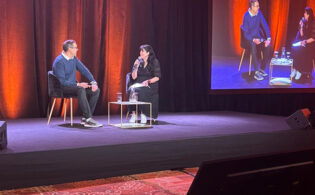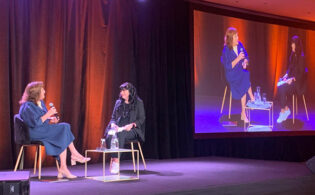Billy Rovzar, CEO of Lemon Studios, and Diego Ramírez Schrempp, executive producer and partner at Dynamo, participated in the Keynote: From the Source at MIP CANCUN, moderated by Elizabeth Bowen-Tombari, editor of TV Latina, focusing on the growing importance of showrunners in Latin America, working with platforms and production challenges.
The conversation began by reflecting on the pandemic years, with Bowen-Tombari highlighting the increase in viewing hours due to lockdowns. “There was an impression that the industry had slowed down a bit,” Bowen-Tombari noted. “Now, overall, we’ve returned to pre-pandemic viewing numbers.”
In response, Rovzar said, “Platforms operate with data, numbers and algorithms. At first, we all thought that people started watching more TV because we were locked down, and platforms assumed that would continue. Then, the pandemic ended, and we realized that didn’t happen. What occurred was peculiar because platforms began buying content compulsively. So the pandemic ends, the industry contracts, and now I think we’re in the process of stabilizing and returning to where we were before.”
Ramírez Schrempp agreed, stating, “There was a boom. Clearly, no one knew how long the pandemic would last. After that, the market slowed down significantly and became more competitive in certain types of demand. I believe this demand has changed not only in quantity but also in the type of content now dominating platforms. This has created greater competition, especially in niches and specific content categories.”
He added, “We’re all now competing for the same slots, whereas before, there was more diversity, and each could focus on different segments. Now, the competition is concentrated on the same types of content, making it even harder to stand out.”
The conversation then shifted to how productions are conceived, with Bowen-Tombari asking whether they are developed from a local to a global perspective or vice versa.
“We always start from the local, betting on authenticity,” Ramírez Schrempp emphasized. “Even with something like One Hundred Years of Solitude, a globally recognized IP, the focus remains rooted in the local. When you watch it on December 11 on Netflix, you’ll notice a distinct Caribbean and deeply Colombian flavor. From the technical language to the setting, everything is infused with that essence, and I think that’s what makes it feel truly original.”
“Universality is specific,” Rovzar said. “If I tell you, ‘There’s an amazing series from Brazil,’ you might say, ‘Interesting.’ But if I tell you, ‘There’s an incredible series from São Paulo,’ your interest might pique a little more. Now, if I tell you it’s about a specific corner of São Paulo, where something fascinating happens, like a building where all the information on a particular topic is stored, your curiosity skyrockets. You want to watch that series, not just because it’s from Brazil, but because it takes you to that specific place, with a unique and detailed story.”
Discussing the projects they choose to work on, Rovzar explained, “We make the series or movies we want to make; it’s as simple as that. Sometimes, you get a commission for something or work on something that doesn’t necessarily come from you. But I think there’s a divide here. On one side, there’s what you’re commissioned to do, something we treat with the same respect and attention as our own projects. However, when it’s something of ours, it has a very special essence, something unique that truly moves us and connects with us in a different way.”
“In that sense, we don’t have a bias toward any particular genre or theme, and we have a varied portfolio,” Ramírez Schrempp noted. “In our early days, we were closely associated with topics like drug cartels in all their different forms, but today we have romantic comedies, One Hundred Years of Solitude, and we’ve worked to diversify our portfolio, always—like Billy said—doing what makes us proud.”
Discussing the production process, Bowen-Tombari asked about the main challenges in development and the lessons learned.
Regarding the adaptation of One Hundred Years of Solitude, Ramírez Schrempp emphasized the numerous challenges. “How do you adapt such an iconic novel, something almost sacred in Latin American literature?” he said. “There’s a huge challenge in doing it with great respect and, above all, staying true to the essence of the novel. That was very important to us, but also doing it fearlessly. We knew that working with fear would make it impossible to approach such an iconic work appropriately.”
Ramírez Schrempp added that this was one of the main creative challenges, but it was also a major production project since “an entire town was built. But perhaps the biggest production challenge was portraying the passage of time. A hundred years pass in the novel, and that has to be reflected on screen. You see it in the changing town, the actors, the wardrobe, everything starts changing rapidly. That, from a production perspective, is a gigantic challenge.”
Rovzar then shared his experience with Las azules, which tells the story of four women who defy the ultra-conservative norms of the time and join Mexico’s first female police force, only to discover that their squad is a publicity stunt to divert media attention from a brutal serial killer.
“It’s the first series we’ve done with Apple, and just developing the scripts took about a year and a half,” Rovzar said. “As a writer, you have to know how to handle different speeds. The message I’d like everyone to communicate to platforms, and that they really understand, is that the script is the most important thing in any TV series or movie. It’s more important than the actors, producers, the wardrobe, everything. A bad script with the best production will fall flat and won’t work. A good script is hard to beat.”
He added, “Sometimes I notice that platforms try to cut costs here. And we’re talking about pennies in terms of the budget because when you negotiate a series or movie, we’re talking millions, and these pennies are mere hundreds. Everything written has a reason; there’s a rhythm, a word count and sentence structure. If an actor suddenly says, ‘No, I want to say it this way,’ the answer is no. Only the showrunner can make that call. I think the most I’ve learned is the importance of having showrunners who are there, who write and who can defend the script.”
Speaking about the importance of the showrunner and the growing recognition of their role in Latin America, Ramírez Schrempp commented, “The term originated in the U.S., and the showrunner must have the criteria to make decisions and take action on set when needed. I think having that criteria is crucial, and it’s something we need to pass on to the new generations. It’s critical that they have the knowledge and, above all, the training to make decisions that can be absolutely critical at certain moments.”






